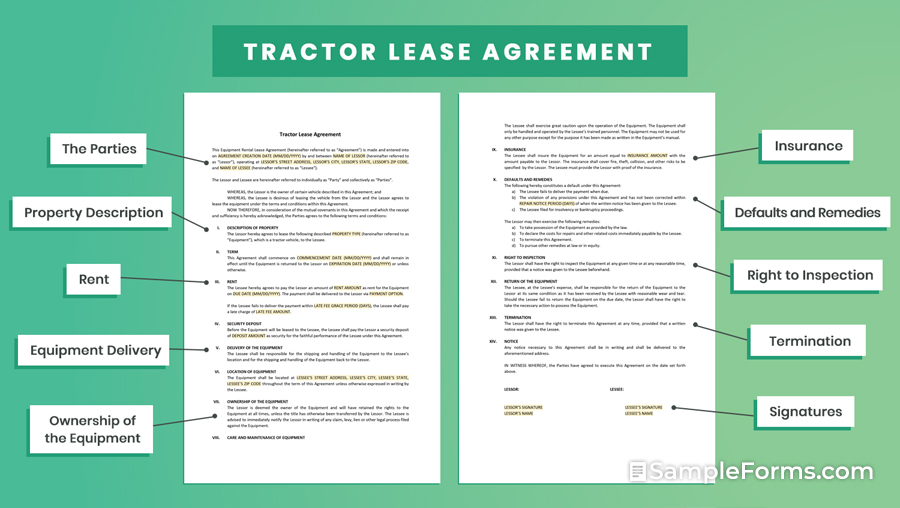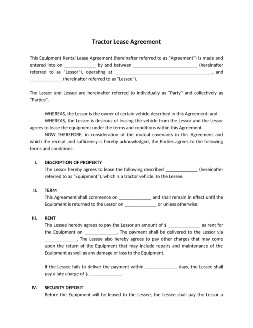- Eviction Notice Forms
- Power of Attorney Forms Forms
- Bill of Sale (Purchase Agreement) Forms
- Lease Agreement Forms
- Rental Application Forms
- Living Will Forms Forms
- Recommendation Letters Forms
- Resignation Letters Forms
- Release of Liability Agreement Forms
- Promissory Note Forms
- LLC Operating Agreement Forms
- Deed of Sale Forms
- Consent Form Forms
- Support Affidavit Forms
- Paternity Affidavit Forms
- Marital Affidavit Forms
- Financial Affidavit Forms
- Residential Affidavit Forms
- Affidavit of Identity Forms
- Affidavit of Title Forms
- Employment Affidavit Forms
- Affidavit of Loss Forms
- Gift Affidavit Forms
- Small Estate Affidavit Forms
- Service Affidavit Forms
- Heirship Affidavit Forms
- Survivorship Affidavit Forms
- Desistance Affidavit Forms
- Discrepancy Affidavit Forms
- Career Assessment - 16+ Examples, Format, Tips, Pdf Forms
- Undertaking Affidavit Forms
- General Affidavit Forms
- Affidavit of Death Forms
Tractor Lease Agreement
Leasing farming equipment, such as tractors, allows farmers to save money, mainly if they are farming seasonal crops. But to make leasing a vehicle such as a tractor more safe and secure, it is better to lay down the guidelines about its use and care clearly. Lay out clear leasing terms for your tractor using a tractor lease agreement. Read More
Tractor Lease Agreement
- Why do we need to include insurance in creating a tractor rental/lease agreement?
- Is the lessee responsible for the tractor’s care, maintenance, and repair?
- Do we need to notarize a tractor rental/lease agreement?
- Can I permit the lessee to inspect the tractor before leasing?
- Who handles the tractor’s delivery in a tractor rental/lease agreement?
What Is a Tractor Lease Agreement?

Tractors are an indispensable part of farm work, and leasing these essential pieces of equipment should be well documented in writing. A tractor lease agreement is a document that outlines the terms and conditions, as well as the guideline regarding its use and care. Furthermore, this document should be notarized to make leasing the tractor more convenient, safe, and secure.
How to Create a Tractor Lease Agreement
Tractors provided farmers a degree of convenience, unlike that of the plow. But because of its cost, not every farmer has the privilege and luxury to buy and own one. Leasing is a cost-saving option for farmers, especially for those working their lands seasonally. And to make leasing your tractor more convenient, safe, and secure, here are the steps on how to create a motor vehicle rental or lease agreement.
1. Indicate the Parties of the Lease
Indicating the parties of the tractor’s lease allows for defining the persons bound by its terms and conditions. And, the lessor and the lessee are the parties of the agreement. So when creating a tractor rental/lease agreement, each of them should be introduced with their names and mailing addresses.
2. Lay Down Its Terms and Conditions
The next thing you should do in creating a tractor lease agreement is to lay down its terms and conditions. Terms and conditions include the lease term’s coverage period, its expiry date, and the conditions of the lease renewal and termination as well. Make sure to include these when creating your tractor’s rental/lease agreement.
3. Include Guidelines for Its Use and Care
Aside from the tractor’s lease terms and conditions, it is essential to include the guidelines for the tractor’s use and care. Leasing your tractor will subject it to hard usage, and it is crucial to provide your asset some degree of protection. For you to do this, you just have to outline the details of the tractor’s usage, care, and maintenance in your tractor’s rental form or lease agreement.
4. Outline the Lease’s Payment Details
Leasing your tractor always requires a payment of some sort. And in writing your tractor’s rental/lease agreement, it is also important to outline the lease’s payment terms and details. Payment terms and details include the amount for lease payments, security deposits, and insurance. Besides, it also consists of the methods of payment and terms agreed by both parties, such as periodic payments and payment by checks, and loan agreement.
5. Sign and Seal the Deal
The last part of creating your tractor’s rental/lease agreement is to agree itself. This is usually done with both parties signing the agreement on the space provided on its bottom part. As with a bill of sale, signing your tractor’s lease agreement indicates the acceptance of both parties of its provisions. And to make your agreement more secure, have the document notarized by your local public notary.
Frequently Asked Questions
Why do we need to include insurance in creating a tractor rental/lease agreement?
Leasing a tractor subjects the equipment to heavy usage. It may also make the tractor prone to damages, as well. Providing insurance to the tractor during its lease allows you to give some degree of protection to your asset and your business. In a tractor rental/lease agreement, the tractor’s insurance is usually shouldered by the lessee, including the payment of its monthly dues and fees.
Is the lessee responsible for the tractor’s care, maintenance, and repair?
Leasing a tractor allows the lessee to possess the equipment temporarily. And this also subjects the tractor to heavy usage, as well. Because of that, the lessee will be responsible for the tractor’s care and maintenance during the duration of the lease. Then, the lessee also handles its repair in the event the tractor incurs damage from wear and tear.
Do we need to notarize a tractor rental/lease agreement?
Tractor rental/lease agreements aren’t necessarily notarized. However, there are some instances where you need to do so. These could either be because your state requires it or when you and lessee agree to do so. You can also require a tractor rental/lease agreement if you feel the need to add an extra layer of security in the lease.
Can I permit the lessee to inspect the tractor before leasing?
Yes, you can. Allowing the lessee to inspect the tractor before leasing is well within their rights as part of the lease. There are also state legislations that require these when leasing equipment, as well. Always include this part in creating a tractor rental/lease agreement. And, do not forget to outline the details of the tractor’s inspection, such as its inspection period, as well.
Who handles the tractor’s delivery in a tractor rental/lease agreement?
Along with care, maintenance, repair, and insurance, delivery of the tractor is the lessee’s responsibilities in a tractor rental/lease agreement. The lessee usually handles the tractor’s delivery, and shipping fees, to their location as well as when returning the tractor to the lessor. This part should be well detailed and elaborated on in creating a tractor’s rental/lease agreement.
Tractors have somewhat lifted agriculture from the burden of the plow. But unlike the plow, tractors do not come as cheaply and easily within every farmer’s reach. Owning tractors can also be expensive, especially for seasonal planters. And leasing equipment when planting season begins is a win-win solution for them and you as well. And in that case, every lease you make should be well documented in writing with a tractor rental/ lease agreement.
